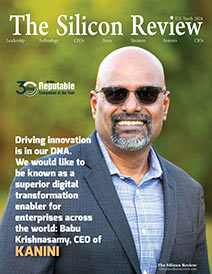An innovator delivering comprehensive cognitive health solutions to empower physicians to deliver high-quality, personalized cognitive health: BrainCheck
The Silicon Review
![]()
Founded in 2015 by neuroscientists and technologists Dr. David Eagleman and Dr. Yael Katz, BrainCheck helps reduce the human and economic toll of cognitive impairment and dementia through its interactive cognitive assessment and cognitive care planning technology. Hundreds of hospitals and clinical practices use the BrainCheck platform, to help thousands of patients live better and safer lives at home, to decrease caregiver frustration, and to save health systems trillions of dollars. For decades, doctors and scientists have relied on subjective tests to measure cognitive function. Now, BrainCheck’s clinically validated cognitive assessments and comprehensive cognitive health platform offer providers an easy-to-use, objective way to assess and analyze patients’ cognitive health. The BrainCheck® Toolkit allows healthcare providers to access digital copies of many publicly-available behavioral, psychological, and somatic screeners and commonly used in clinical practice. The BrainCheck Toolkit is designed to assist healthcare providers in collecting and documenting patient information more easily and efficiently. The BrainCheck platform includes digital versions of many commonly used screeners for mild cognitive impairment (MCI) and dementia. These include the St. Louis University Mental Status (SLUMS) exam and the Short IQCODE.
Additional cognitive screening tools included with the BrainCheck platform include digital versions of the clock-drawing test, a cognitive decline questionnaire, and a range of screening tools for detecting traumatic brain injury. Depression and anxiety can often be symptoms of cognitive impairment — and vice versa. The BrainCheck platform includes digital versions of the PHQ-9, Geriatric Depression Scale, and GAD-7 questionnaires. Stress can also contribute to cognitive impairment. The BrainCheck platform includes the Perceived Stress Scale questionnaire, as well as PCL-5 post-traumatic stress disorder (PTSD) checklist.
Modern Problems Require New Solutions
In recent years, the United States has seen an overall decline in dementia. Unfortunately, new studies suggest that the country may see a significant reversal in that trend as the Baby Boomer generation ages. One particular study published in the Journals of Gerontology: Social Sciences found that cognitive functioning test scores showed Baby Boomers were at higher risk for dementia than previous generations. Research shows cognition scores increased for those born between 1890 (Greatest Generation) and 1942 (early Boomers). However, those scores declined for individuals born between 1948 and 1953. And they deteriorated further in those born between 1954 and 1959. It’s notable that these results cut across all groups in the 30,191-person survey conducted from 1996 to 2014. Previous research has shown that wealthier individuals were less likely to show cognitive decline. But this latest analysis found that dementia risk was present at all levels of education, income, and wealth. Lifestyle factors such as loneliness, depression, obesity, inactivity and a lower likelihood of being married seemed to be the most critical.
These are troubling trends. They suggest the U.S. will face an unprecedented wave of dementia and cognitive decline. And unfortunately, current rates of cognitive assessment, diagnosis of dementia, and cognitive care planning are lacking. Cognitive decline in Baby Boomers is beginning as young as 50. This is despite better health, higher education, and more competitive jobs than their parents’ generation. Since childhood conditions don’t seem to be the cause of this increased dementia risk for Boomers, research suggests symptoms of modern life such as increased social isolation, disparities in access to health care, and growing income inequality are likely contributing factors. So how can older adults get ahead of these dementia risks and manage them if they begin to manifest? Assessing cognitive function earlier could prevent significant cognitive impairment. And technology is leading the way.
BrainCheck gives providers the tools to assess cognitive health more efficiently to monitor specific impairments or emerging cognitive issues. It also enables clinicians to screen patients for factors such as depression, anxiety, opioid addiction and ADHD with valid behavioral health benchmarks so they can make recommendations for mental health and lifestyle improvements to help slow dementia risk. If they haven’t already, physicians should talk to patients in this generation about their cognitive concerns? Asking about subjective memory complaints or cloudy thinking is the first step to identify and address cognitive impairment. And early detection and intervention are critical to reversing this trend.
Pediatric Concussion and BrainCheck Study
Pediatric concussion is challenging to diagnose, particularly because children are constantly cognitively maturing and current diagnostic tools lack adequate sensitivity and specificity. Undetected concussion can be detrimental for a child’s brain development. This is important in the case of athletes, where athletes who express concussion symptoms must be removed from play to mitigate risk of further injury. Thus, an accessible and rapid cognitive test for the detection of concussion among children could be of great use. BrainCheck’s research team recently conducted a pilot study testing the utility of BrainCheck in detecting pediatric concussion, and has found promising results.
Statistical analyses were performed to see if there were any significant differences in performance on BrainCheck among the concussion group compared to the control group. The company’s results show concussion patients had significantly diminished performance on BrainCheck Coordination, Immediate & Delayed Recognition, and Stroop tasks.
Meet the leader behind the success of BrainCheck
Yael Katz, PhD, Co-Founder and CEO of BrainCheck is a Northwestern- and Princeton-trained neuroscientist with a strong analytics background. Yael brings proven scientific and business leadership to BrainCheck, raising $20 million in venture capital, overseeing the development and commercialization of the company’s cognitive assessment and care platform, and cultivating a top-notch team with offices in Houston and Austin.









